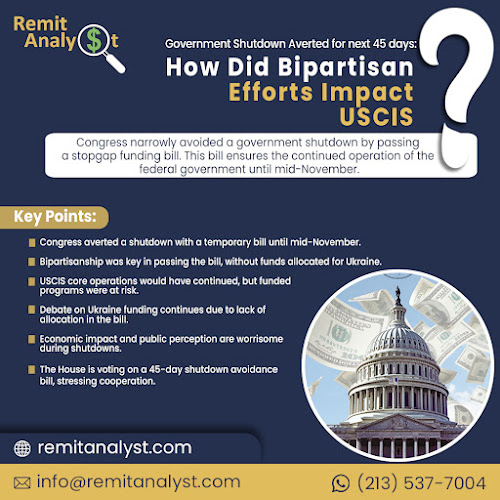Key Points:
- Congress successfully averted a government shutdown by passing a temporary funding bill, maintaining government operations until mid-November.
- Bipartisan cooperation between House Democrats and Republicans was pivotal in passing the bill, which also avoided funding for Ukraine.
- USCIS, primarily funded by filing fees, would have continued core operations during a government shutdown, but programs relying on appropriated funds would have been affected.
- Challenges and debates lie ahead concerning Ukraine funding, as the bill's failure to allocate funds reflects shifting Republican support.
- Economic impacts and public perception are significant concerns during government shutdowns, with Americans often holding both parties responsible.
- The House is voting on a 45-day shutdown avoidance bill, emphasizing the importance of cooperation in.
Introduction
In a remarkable turn of events, Congress narrowly avoided a government shutdown by passing a stopgap funding bill. This bill ensures the continued operation of the federal government until mid-November. Following Senate approval, President Biden swiftly signed the bill into law, securing the functioning of government agencies and allocating critical funds for disaster recovery efforts. Notably, the bill did not include funding for Ukraine, a matter of international concern. Nevertheless, House Democrats rallied behind the bill as a pragmatic solution to prevent a disruptive government shutdown.
Bipartisan Cooperation Prevails:
The unexpected cooperation between House Democrats and Republicans played a pivotal role in averting the shutdown. Speaker Kevin McCarthy, who had previously resisted working with Democrats on a spending solution, presented the proposal to Republicans. To expedite the bill's passage, he utilized a special procedure that required substantial Democratic support. Surprisingly, the bill received overwhelming approval, with 335 votes in favor and only 91 opposed. This bipartisan effort echoed a similar vote earlier in the year to suspend the federal debt limit.
USCIS: An Agency on the Line
Amid the political turmoil surrounding the government shutdown threat, the functioning of critical agencies like U.S. Citizenship and Immigration Services (USCIS) was at stake. USCIS operates primarily on funding generated from filing fees. Consequently, during a government shutdown, USCIS would face significant challenges:
Processing Applications:USCIS would continue processing applications as usual, ensuring that individuals' immigration petitions are not unnecessarily delayed.
Accepting and Adjudicating Most Applications:Most immigration applications would continue to be accepted and adjudicated, minimizing disruptions in legal immigration processes.
Processing Petitions:USCIS would proceed with the processing of petitions, allowing families and individuals to move forward with their immigration-related matters.
However, while core USCIS functions would continue, programs dependent on appropriated funds would face suspension or severe impact. Notably, the Department of Labor (DOL) would halt the acceptance and processing of applications and materials related to critical immigration processes, including Labor Condition Applications (LCAs), Prevailing Wage Determinations, and Applications for Permanent Employment Certification through the PERM system.
Despite these challenges, USCIS would remain committed to providing essential immigration services, including consular services, passport services, and visa services, all of which play pivotal roles in facilitating international travel and immigration processes. Additionally, border and immigration enforcement would persist.
Implications and Future Challenges:
While the immediate crisis was averted, the absence of funding for Ukraine in the bill highlighted challenges ahead. Members of both parties expressed confidence in securing funding for Ukraine in the coming weeks. However, the bill's failure to allocate funds reflected a shift in Republican support for additional funding for Ukraine. The issue of funding Ukraine's war effort is expected to be a contentious debate, following President Zelensky's visit to Washington and President Biden's request for $24 billion in aid.
Furthermore, the stopgap funding bill is a temporary solution to a more extensive spending battle. Both the House and Senate grapple with passing yearlong spending bills, with House Republicans canceling an October break to focus on this legislation. The significant gap in spending priorities between the two parties, along with internal divisions, remains a considerable hurdle.
Economic Impact and Public Perception:
A government shutdown could have had severe economic consequences. Approximately 800,000 federal employees would have been furloughed, leading to disruptions in various government services. This includes essential services such as air traffic control, airport security, and food inspection, which would have continued but without pay for those responsible. The potential economic fallout and damage to the country's reputation were significant concerns.
Government shutdowns often lead to public frustration and disapproval of elected officials. Recent history has shown that Americans generally place blame on both parties when a shutdown occurs. The ability of Congress to avert a shutdown can influence public perception of its effectiveness and willingness to work together.
The Path Forward:
The House is voting now on a bill to avoid a shutdown for 45 days, providing temporary relief. The recent bipartisan effort to pass a stopgap bill and avert a government shutdown underscores the importance of cooperation in times of crisis. The tension between party loyalty and practical governance was evident throughout this episode. Looking ahead, Congress will face the challenge of securing funding for Ukraine while addressing broader spending issues, highlighting the complexities of modern American politics and governance. The ability to find common ground will be crucial in ensuring the continued functioning of the government and meeting the needs of the American people.
Google Source : Government Shutdown Averted for next 45 days: How Did Bipartisan Efforts Impact USCIS?


0 Comments